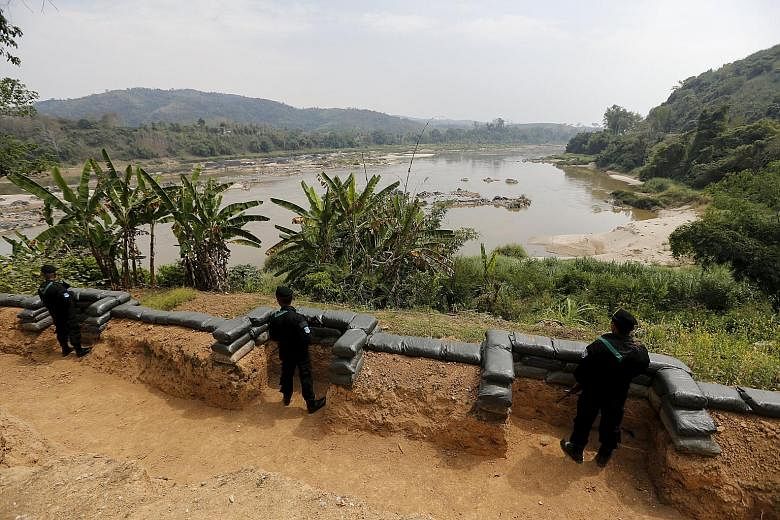MEKONG RIVER • The Lao People's Army patrol boat was custom- made in China with night-vision capability and two of the most powerful engines on a remote stretch of the Mekong River.
Today, like most days, it sits idle for lack of petrol, guarded by a single Laotian soldier in flip-flops.
Even occasional patrols by boats like these, supplied by China to the Laotian army and Myanmar police, have successfully subdued the pirates who once robbed the river's cargo ships with impunity.
But there has been little progress on another objective - stemming the flood of illicit drugs - exposing the limits of China's hard power in mainland South-east Asia even as Beijing accelerates its militarisation of disputed islands in the South China Sea.
While attacks on shipping have tailed off, drug production and trafficking in the untamed region, known as the Golden Triangle, is booming - despite the presence of Chinese gunboats and units of Chinese armed police along the river.
The United Nations Office on Drugs and Crime (UNODC) estimates that South-east Asia's trade in heroin and methamphetamine was worth US$31 billion (S$42 billion) in 2013. "That's bigger than the economies of some South-east Asian countries," says UNODC's Asia-Pacific chief Jeremy Douglas.
"It's like having an undeclared sovereign state in your midst with no borders and lots of money."
Enter another Mekong boat, looking at first glance like a pleasure cruiser filled with middle-aged tourists. In fact, they are senior police and drug experts from four countries, among them one of China's top anti-narcotics officials, Mr Wei Xiaojun.
Arranged by UNODC and lent further clout by Mr Wei's involvement, their recent voyage down the Mekong was aimed at mustering the regional collaboration needed to tame the Golden Triangle.
Reuters was invited to join the four-day trip from the Chinese port of Jinghong through the heart of the Golden Triangle.
Mr Wei, who is deputy secretary- general of China's National Narcotics Control Commission (NNCC), called drugs the "main threat" along the Mekong. "All other types of organised crime are rooted in the drug business, like human trafficking, money laundering and the illegal wildlife trade," he said.
China is a favourite destination for Myanmar's drugs, which are flowing through Asia in unprecedented quantities.
More than 250 million methamphetamine pills, better known by their Thai name "yaba" or "crazy medicine", were seized in East and South-east Asia in 2013, an eightfold increase from 2008.
Seizures of "crystal meth" or "ice" - a potent, crystalline form of methamphetamine dubbed "the poor man's cocaine" - doubled during the same period.
Last year, China seized a record 36.5 tonnes of methamphetamine, most of it from Myanmar, according to UNODC. Myanmar is the world's second-largest producer of opium, the bulk of which ends up in China as heroin.
A recent report from the NNCC raised concerns about the involvement of some Chinese military personnel in drug trafficking, and said the number of registered drug users in China rose to more than 2.3 million last year.
Increasingly, Myanmar too has a drug problem, with police last year making record-breaking busts of both "yaba" and "ice".
This could severely test the new government of Ms Aung San Suu Kyi, whose National League for Democracy has yet to formulate drug policies, say experts.
REUTERS

